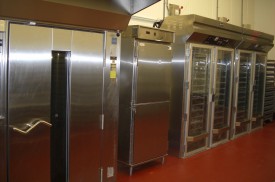
Rutgers EcoComplex was awarded a $157,517 grant from the U.S. EPA, Region II Pollution Prevention Program that’s aimed at helping New Jersey’s food processors, storage and distribution facilities to become more energy efficient and environmentally sustainable through upgrading refrigeration systems, using safer chemicals, reducing water and energy use, and increasing employee training.
“This project will require working closely with the existing food processing, cold storage and distribution facilities to evaluate their current practices and provide them with customized technical assistance and training to improve their sustainability,” says Serpil Guran, director of the Rutgers EcoComplex and the project’s principal investigator.
Among the partners in this project, which will target food supply chain facilities in Newark and Jersey City, are the Rutgers Food Innovation Center (FIC), the New Jersey Department of Environmental Protection and Newark Refrigerated Warehouse LLC.
The Rutgers EcoComplex, which is New Jersey’s clean energy and environmental research, outreach and business incubation center, along with its project partners will provide training to the food processing, storage and distribution facilities in the coming months. After identifying the facilities and determining their current practices and related emissions baseline, the project will provide extensive training to help the facilities reduce their emissions and operating costs. In addition, a website and volunteer registry will be created to keep the facilities informed and supported during and following the project’s completion.
“The Rutgers FIC is pleased to partner with the EcoComplex on this important project where we can leverage our expertise to help create a more sustainable supply chain in the state’s $105 billion food industry,” said Lou Cooperhouse, director of the FIC and co-principal investigator of the project.
The food processing and distribution industry plays a huge role in the wellbeing of state residents and the vitality of New Jersey’s economy.
“Rutgers is excited to have been selected for this collaboration of public-private partnership that includes academia, government and industry where we can contribute much needed expertise to this important industry,” said Margaret Brennan-Tonetta, associate vice president for economic development at Rutgers.
Essex and Hudson counties were targeted of this project for their close proximity to the Port of New York and New Jersey, explained Guran. The largest port on the entire East Coast, it is poised for significant growth with the expansion of the Panama Canal, scheduled to be completed in late 2016.
According to Guran, additional volume of goods is expected for distribution to the 100 million American consumers who live within a 24–hour drive of the port. In addition, perishable goods, especially food products, traveling to and from the port will need to be temporarily staged in refrigerated storage, a large increase in demand for refrigerated storage is expected, she added.
Most of the roughly 500 refrigerated storage establishments are small or mid-size facilities, which could benefit from the technical assistance to improve their operations, learn safe handling of hazardous materials, reduce their carbon emissions through energy efficient measures, conserve water resources, and be more sustainable, Guran explained.

